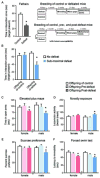Paternal transmission of stress-induced pathologies
- PMID: 21679926
- PMCID: PMC3217197
- DOI: 10.1016/j.biopsych.2011.05.005
Paternal transmission of stress-induced pathologies
Abstract
Background: There has been recent interest in the possibility that epigenetic mechanisms might contribute to the transgenerational transmission of stress-induced vulnerability. Here, we focused on possible paternal transmission with the social defeat stress paradigm.
Methods: Adult male mice exposed to chronic social defeat stress or control nondefeated mice were bred with normal female mice, and their offspring were assessed behaviorally for depressive- and anxiety-like measures. Plasma levels of corticosterone and vascular endothelial growth factor were also assayed. To directly assess the role of epigenetic mechanisms, we used in vitro fertilization (IVF); behavioral assessments were conducted on offspring of mice from IVF-control and IVF-defeated fathers.
Results: We show that both male and female offspring from defeated fathers exhibit increased measures of several depression- and anxiety-like behaviors. The male offspring of defeated fathers also display increased baseline plasma levels of corticosterone and decreased levels of vascular endothelial growth factor. However, most of these behavioral changes were not observed when offspring were generated through IVF.
Conclusions: These results suggest that, although behavioral adaptations that occur after chronic social defeat stress can be transmitted from the father to his male and female F1 progeny, only very subtle changes might be transmitted epigenetically under the conditions tested.
Copyright © 2011 Society of Biological Psychiatry. Published by Elsevier Inc. All rights reserved.
Conflict of interest statement
Figures


References
-
- Ustun TB, Ayuso-Mateos JL, Chatterji S, Mathers C, Murray CJ. Global burden of depressive disorders in the year 2000. Br J Psychiatry. 2004;184:386–392. - PubMed
-
- Kessler RC, Berglund P, Demler O, Jin R, Koretz D, Merikangas KR, et al. The Epidemiology of Major Depressive Disorder. JAMA: The Journal of the American Medical Association. 2003;289:3095–3105. - PubMed
-
- Sullivan PF, Neale MC, Kendler KS. Genetic epidemiology of major depression: review and meta-analysis. Am J Psychiatry. 2000;157:1552–1562. - PubMed
-
- Weissman MM, Wickramaratne P, Nomura Y, Warner V, Verdeli H, Pilowsky DJ, et al. Families at high and low risk for depression: a 3-generation study. Arch Gen Psychiatry. 2005;62:29–36. - PubMed
Publication types
MeSH terms
Substances
Grants and funding
LinkOut - more resources
Full Text Sources
Other Literature Sources
Medical

